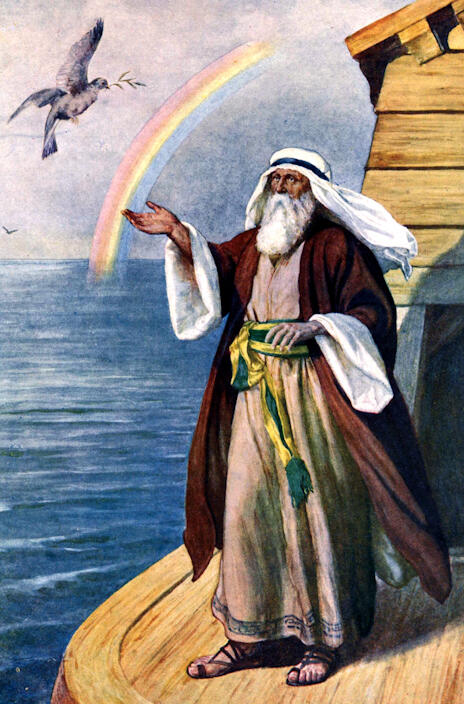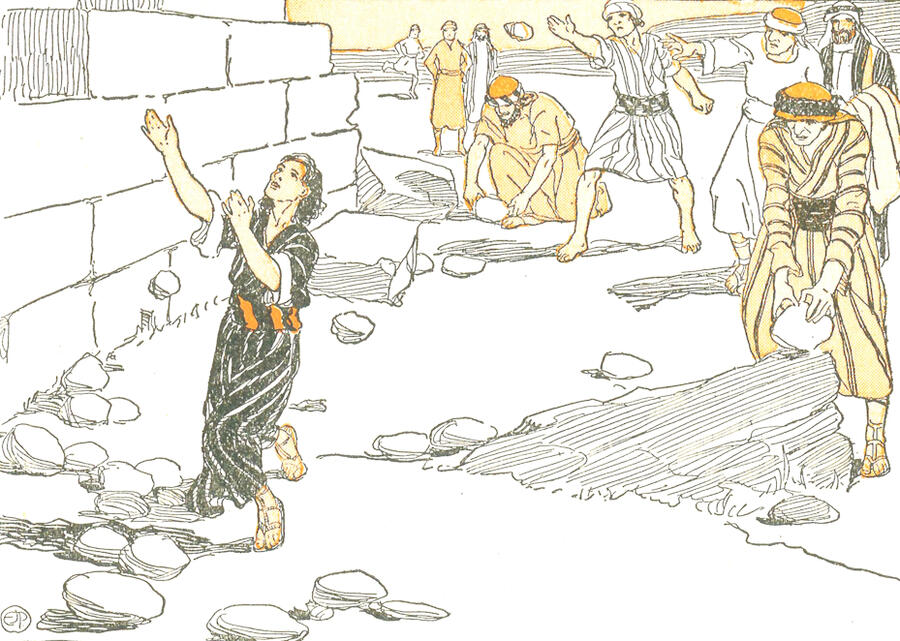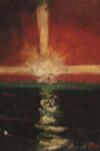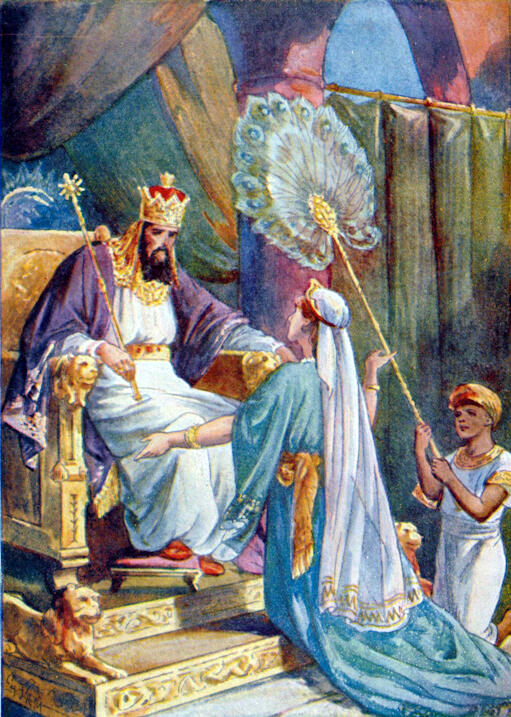Text

Contact: allisgrace@gmail.com
Old Testament
New Testament
The Story of Creation
from the Old Testament Book of Genesis
Away back at the very beginning of time, God made the world. Not as we see it today, for all was darkness everywhere. What a strange and unfriendly world this must have been, for no living creature could dwell in it. But God planned to make it beautiful, so he caused the light to shine. This light he called day, and the darkness he called night. And then the evening and morning of the first day of time passed by. On the second day, God made the beautiful blue sky. He called the sky heaven. On the third day, he caused the waters to flow together in wide, deep places, and he called them seas. Dry land then rose up, and this he called earth. But as yet there were no grasses, flowers, nor trees. The whole earth was barren and desolate. So God caused the carpet of grass to grow upon the bare ground and beautiful flowers to spring up from the earth. The trees and herbs also he made to grow at his will. When God beheld all these things, he saw that they were good. On the fourth day appeared the great lights, which we see in the sky: the sun, the moon, and the stars. These he made to divide the day from the night. After all these things were made, God began to create living creatures. He made fishes of all kinds and sizes to swim about in the seas, and birds of every description to fly about above the water and land, just as we see them doing today. Thus the world continued to become more delightful, and the fifth day of the first week of time passed by. On the sixth day, God made all the animals great and small and every creeping thing. Then there was life abounding in the woods and on the plains, as well as in the air and in the sea. What a beautiful world! Still, what a strange world, for there were no people in it. But God had not yet finished his work of creation, for he wished to have people live in the wonderful world he had made. They could enjoy its beauties and care for it, and more, they could know who had made all these great things. And knowing God, they could love and worship him. Male and female he created them in his image and likeness. He blessed them and gave them authority over all the other animals on earth. “Be fruitful and multiply,” he told them. “Fill the earth and subdue it. Every seed-bearing plant is to be your food.” When the sixth day ended, God had made the world and had placed everything in it just as he wished. Therefore, on the seventh day, he rested from his work.
Old Testament

The Story of the Flood
from the Old Testament Book of Genesis
Adam lived to be nine hundred and thirty years old, and during that time he lived to see his grandchildren, his great grandchildren, yes, even his great-great-great-great grandchildren grow up around him. The people in those days were very wise and clever, and Adam must have told them many of the wonderful things he had learnt from God in the Garden of Eden. There were also giants on the earth in those days, and many mighty men.
But when God looked down on the earth, He saw that most of the men and women were very wicked, and it grieved Him in His heart.
But there was one man named Noah who was faithful to God and did that which was right. So God told Noah how troubled He was because of the evil and the violence which He saw amongst men, and that He must surely destroy all the people.
God promised Noah, however, that He would save him and his family; so He told him to build an Ark of wood, which was to be covered within and without with pitch, so that the water could not soak through. The Ark was to be very large, three stories high, and each story was to be full of little rooms. There was to be a large window for light, along the whole length of the roof, and a door in the side.
Then God told Noah that He was going to bring a great flood of waters on the earth which would destroy all flesh, both human beings and animals; but that He would save Noah and his wife, his sons and their wives, and seven of every sort of animal that was good for food, and two of every sort of the rest. Noah was also told to collect all kinds of food into the Ark.
It took Noah one hundred twenty years to build the Ark, and how his neighbors laughed, but he and his three sons did not weary of the work.
When at last it was finished, and Noah and his family and all the animals had gone inside, God shut the door on them. Then the terrible flood came, and covered all the earth round about, and drowned all the wicked people, as God had said. Forty days it rained without ceasing. Everything that had life died, and only the Ark was left floating on the waters.
God made a wind to pass over the earth and seas, and the rains stopped. Noah and his family heard the change outside the ark. Oh, how glad they were! But as they looked out, they could see nothing but the water around them, and the clear sky overhead. They could hear the high wind blowing, and the waters rushing backwards and forwards against the sides of the Ark, like a mighty returning tide. At last, after what must have seemed to them a long, long time, they felt the Ark strike against a mountain, and they knew that the waters must be going down. After a while they were still surer, for as they looked out, they could see the tops of other mountains. Then Noah opened the window and sent out a raven.
The great black bird flew off, uttering his strange, wild cry, but he never came back. Then Noah sent out a dove. But she found no rest for the sole of her foot, and she returned to him in the Ark.
After seven days he sent her out again, and this time she returned with an olive leaf in her mouth. By that, Noah knew that some of the lower land must be uncovered, and the trees appearing once more.
Then, after seven days, Noah sent the dove out again, and this time she never came back.
At last Noah took off the covering from the Ark and looked out and found that the earth was dry. Still he waited a little while, until God told him to come out.
So Noah and his family, and all the animals came out of the Ark, and Noah built an altar, and offered a sacrifice to God, and thanked Him for all His loving kindness to them.
Then God blessed Noah and his family: “Be fruitful, multiply, and replenish the earth.” God promised that He would never again bring a flood upon the earth to destroy all life.
He set the beautiful rainbow in the clouds, so that, whenever we see it, we can remember the promise that God has made.


The Story of The First Martyr
from the New Testament book of the Acts of the Apostles
At this time there lived in Jerusalem a young Pharisee named Saul, who was born in the city of Tarsus, to the north of Palestine. When quite young, Saul was sent to a Jewish school, where he learnt to read and write, and to understand Greek and Hebrew. He was especially taught the story and the laws of the Old Testament, and, as there were so few books in those days, he had to learn a good deal off by heart. Besides going to school, Saul learnt the trade of making a coarse kind of linen cloth for tents; but as his masters and his father soon found out that he was cleverer than most of his companions, he was sent off, when about sixteen, to Jerusalem, where he was taught by a wise Pharisee named Gamaliel.
Under this teaching, he made up his mind that he also would be a Pharisee. He was horrified at the followers of Jesus, and at the idea that a man who had been crucified could claim to be King of the Jews and the Son of God, and he honestly thought that anyone who taught such things was worthy of death.
Now, as time passed, the people began to talk of a young man named Stephen, who began to do many wonderful miracles. He was not only good and brave, but he was skilled in argument; and when the Elders and Pharisees gathered together to dispute with him, and to try to prove to him that it was all a mistake about Jesus Christ, Stephen answered them so wisely that they were obliged to admit that they had nothing more to say. This infuriated them, and they began to plot together as to how they might find some excuse for having Stephen put to death.
First of all, they paid some men to be ready to tell lies about him. Then they stirred up the people and the Rulers, and caught Stephen, and brought him before their Council.
As for Stephen, he was not at all afraid. He knew that Jesus Christ had warned His disciples that the time would come when they would be brought before kings and courts and flogged and tortured and put to death for His sake.
So he stood calmly before his judges, and listened as the lying witnesses cried aloud that they had heard him speak horrible words against God and against Moses.
As the councilors stared at their prisoner they were filled with astonishment, for, instead of anger or terror, they saw that his face shone like that of an angel’s.
The High Priest said to the young prisoner:
“Are these things so?”
Stephen made a long speech to the Council, reminding them of the history of the Children of Israel from the time of Abraham down to that day. He showed them how time after time in the past the Rulers had refused to listen to God’s voice, and had killed their good and holy prophets, and persecuted God’s servants; and how, last of all, they had committed the awful crime of betraying and murdering the Lord Jesus Himself.
As they listened, the looks of the council members changed to those of mad fury, and they gnashed at Stephen with their teeth as though they had been wild beasts. But Stephen was not afraid even then. He raised his eyes to heaven, and declared in a voice of gladness:
“Behold, I see the heavens opened, and the Son of Man standing on the right hand of God.”
Until that moment the council members had only held in their hatred and fury with the greatest difficulty; but now they suddenly cried out with a mighty shout, stopped their ears so that they could not hear any more, and, without waiting even to pass judgment, rushed with Stephen out of the Council, along the narrow streets, out at the city gate, and down the rough road.
Stephen knew that they were going to stone him to death, and even as he stood there bound and helpless, and the first stone came crashing down upon him, he cried out: “Lord Jesus, receive my spirit.”
Felled to the ground, he was still able to kneel. In a flash he remembered that Jesus Christ, as they raised Him on the cruel cross, had cried out: “Father, forgive them, for they know not what they do.” So now Stephen, even in his death-agony, cried out in a loud voice: “Lord, lay not this sin to their charge.”
Another stone and yet another fell down upon him, and the terrible end came. The Bible does not say that Stephen died, but that he “fell asleep”, and we know that he waked up in the presence of Jesus Christ his Lord.
And what was the young man named Saul doing, as he watched this awful sight?
I am sorry to say that he was just as eager as anyone that Stephen should die, for he really believed what the lying witnesses had said; and, as they had the right to cast the first stones at Stephen, they had flung off their outer clothes, and Saul had offered to take charge of them.
When all was over, the heart-broken Christians came and took up the body of their beloved brother and buried it reverently, honoring him as the first one to give his life in witness of Jesus’ resurrection.

The BRAVE QUEEN
From the Old Testament Book of Esther
There was once a beautiful orphan girl named Esther, who lived with her guardian, Mordecai, in the city of Shushan, in the kingdom of Persia. Both Mordecai and Esther were of the Jewish race and worshiped the one true God.
The King’s wife, Queen Vashti, had offended him. After a search throughout the whole kingdom for a new queen, he selected Esther and set the royal crown upon her head.
Mordecai was a servant about the King’s palace, and it happened on a certain day that, as he sat near the King’s gate, he heard two men whispering together and plotting to kill King Ahasuerus.
So he told Esther, and she told the King, and the two men were caught and hanged. Yet the King forgot to even thank Mordecai.
The King had a great favourite, who was an Amalekite named Haman. He set him over all his princes and servants, and commanded that everyone was to bow low before him as he passed along.
But Mordecai refused to bow as Haman went past. Haman found out who Mordecai was, and he was filled with anger.
He thought: “I will not only have Mordecai slain, but I will get the King to order the slaughter of all the other Jews in the kingdom.”
So in a cunning manner he approached the King.
The King was so fond of Haman he told him that he might write any orders he liked, and seal them with the royal signet ring.
So Haman wrote letters ordering that the massacre should take place, and had the letters carried through the length and breadth of Persia.
When Mordecai read this terrible proclamation, he rent his clothes, put on sackcloth, strewed ashes on his head. The other Jews wept and fasted, and prayed to God to deliver them.
Mordecai told Esther the whole truth through a messenger, and implored her to go to the King and plead with him to spare the people.
Esther replied that if she went to the King without being bidden, she might be instantly slain. Mordecai replied: “Who knows but whether you have come to the king¬dom for such a time as this?”
Then Esther answered bravely: “Go, gather together all the Jews that are present in Shushan, and tell them to fast, to neither eat nor drink for three days. I and my maidens will fast likewise; and so will I go in unto the King, which is against the law. If I perish, I perish!”
On the third day Esther put on her royal apparel and ventured into the forbidden ground of the King’s Court.
The King was seated on his throne, and though surprised to see her, he smiled and put out his golden scepter towards her. She drew nearer, and touched the top of the scepter. The King said to her:
“Queen Esther, what is your request? It shall be given, even to half of the kingdom.”
Esther bowed and asked that he and Haman should come the next day to a banquet.
The King gladly agreed; and as for Haman, he rushed off home and told his wife how the Queen herself had honored him.
Yet,” he added, frowning, “there is still that wretch Mordecai the Jew who refuses to bow!” Then he had the idea to prepare a tall gallows to hang his enemy.
That night the King could not sleep, and as one of his servants was reading aloud to him from the Court chronicles, he came upon the story of how Mordecai had once saved the King’s life.
The King was deeply interested, and he asked how Mordecai had been honored.
“Nothing was done for him,” was the answer.
Now Haman was so keen to get Mordecai hanged that he had come to ask the King’s leave that very night. The King asked Haman what should be done for a man whom the King wished to honor.
Haman, thinking it was all about himself, answered the King:
“Let the royal apparel be brought, and the horse that the King rides upon, and let a noble prince lead the man on horseback through the streets of the city, proclaiming: ‘Thus shall be done to the man whom the King delights to honor’.”
The King cried: “Make haste, and take the apparel and the horse, and do as you said to Mordecai the Jew, that sits at the King’s gate.”
Haman was furious, but he dared not disobey. He had to lead his enemy through the streets and proclaim his honor.
When all was over, Haman went to Queen Esther’s banquet, though he was in no mood for it.
As the banquet drew to a close, the King asked Queen Esther what he might give her, even to half his kingdom.
Queen Esther stood before the King in all her royal beauty and cried aloud:
“We are sold, I and my people, to be destroyed!”
The King was astonished, for he did not even know that his Queen was Jewish.
“Who is he that dares such a thing?” said the King.
Then Queen Esther turned on the terrified Haman and cried:
“The enemy is this wicked Haman!”
The King rose up in astonishment and in terrible wrath and went out into the garden to seek to control himself.
Haman flung himself before the Queen and pleaded with her for his life, but the King came to a different decision.
One of the chamberlains mentioned the gallows that Haman had prepared for Mordecai. “Hang him thereon!” cried the furious King.
Haman was carried forth and hanged, and the Jews were given help to fight any who tried to harm them.
Thus did God use Queen Esther to save her people.
Old Testament
Old Testament